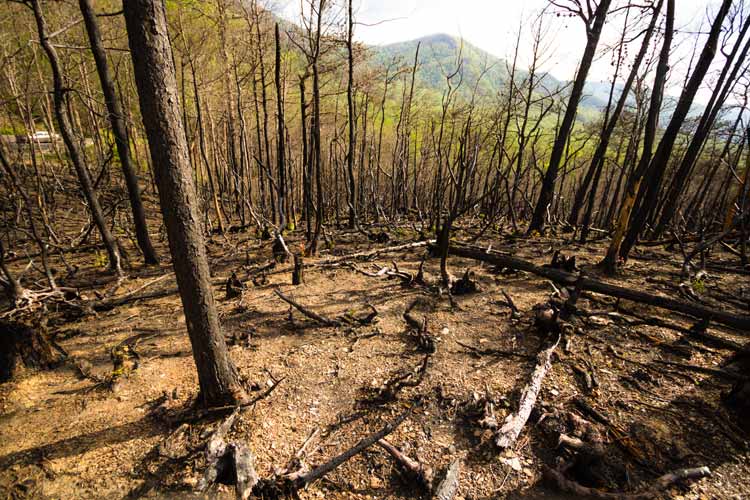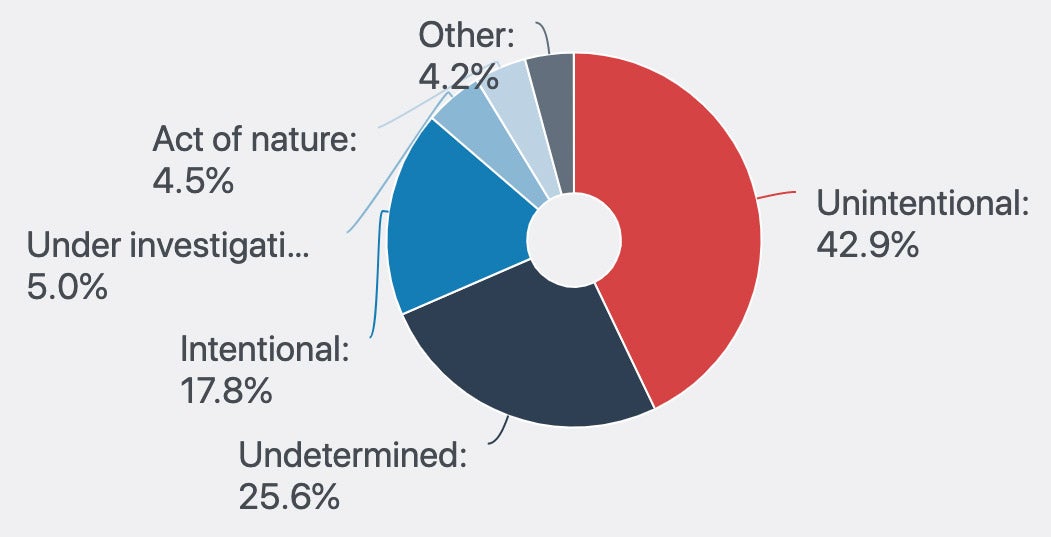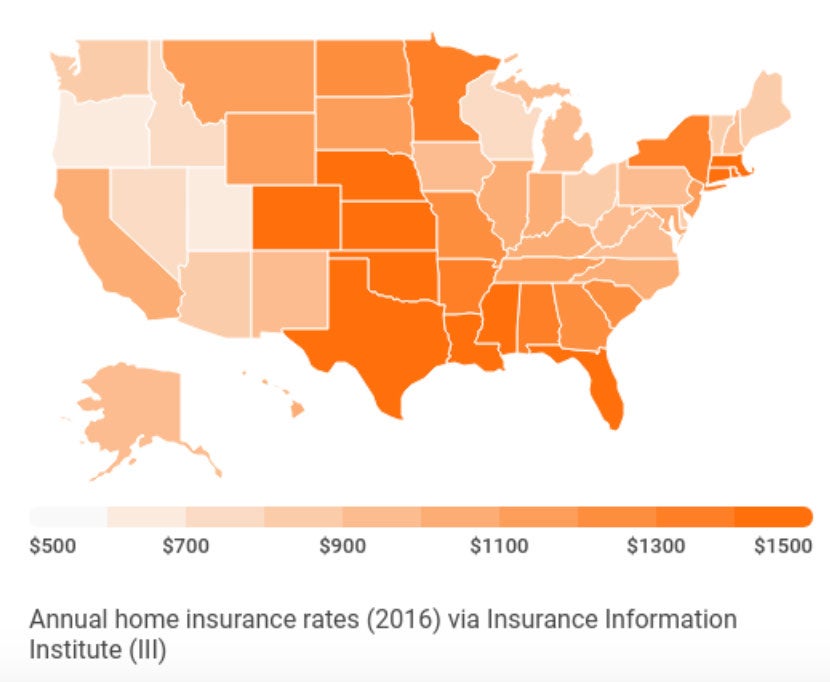
One of the deadliest and most destructive natural disasters is the forest fire. Each year, forest fires started by humans claim millions of acres across the US. In 2018 alone, fires started by humans caused the destruction of 5.64 million acres.
While not all forest fires begin due to human error, about 89% of them do. That’s why it’s so important for residents in Tennessee and the rest of the country to become familiar with fire safety precautions. Here are some essential tips to preventing forest fires.
Tennessee Forest Fire Statistics
Forest fires are devastating and destructive no matter where you live, including Tennessee. Check out these forest fire stats for the state and the US overall.
Causes of Outside Fires, 2018
509,500 outside fires in 2018

In 2018, there were a total of 509,500 outside fires observed in the US overall, and 42.9% of them were unintentionally started. Only 17.8% were intentionally started, and another 25.6% were started by an undetermined source.
Now for some rapid forest fire stats for Tennessee:
- In 2019 alone, the state of Tennessee had a documented 571 wildfires.
- A total of 5,478 acres were burned across the state in just one year.
- 2016 brought some of the deadliest forest fire seasons of the century for Tennessee.
- 119 fires had already spread across Tennessee by April of 2016.
- More than 2,400 acres in Tennessee were burned by wildfires by the spring of 2016.
- More than 800 fires were reported in Tennessee by mid-October of 2016.
- 129 total deaths were reported by the 2016 forest fires in Tennessee.
- Working smoke alarms were absent in 70% of the fatal structure fires in 2016.
With alarming stats like these, it’s all the more important to take as many action steps as possible to help prevent the start and spread of forest fires in Tennessee. Read on for more info.
Steps to Prevent Forest Fires While Camping in Tennessee
While many folks view camping as a leisurely activity, there’s actually quite a bit of work involved in scouting out and setting up a safe campground. One of the biggest risks during a camping trip are any fires started for cooking, roasting marshmallows, or for a source of warmth. In order to prevent your trip (and surroundings) from literally going up in flames, take the following precautions to prevent forest fires while camping in Tennessee:
- Only build a campfire if the campgrounds allow it.
- Never build a campfire in dry conditions.
- Always use existing fire rings/pits when available.
- If building your own fire ring/pit, move at least 15 feet away from your tent and any surrounding trees/foliage.
- Look for low-hanging branches above you, even when you’re several feet away from any trees.
- Keep all flammable objects at least 15 feet away from the fire at all times.
- Make sure the location you scout out for your fire is on level ground and not covered in decaying leaves or brush.
- Choose an area that’s safe from wind and keep an eye on the direction the wind is blowing before starting your fire. Watch for any breezes that start while your fire is burning.
Follow these tips to setting up your own fire pit while camping in Tennessee:
- Remove any foliage/grass/leaves/twigs/etc. from the area you choose, clearing at least a 10-foot diameter around the site.
- Dig a pit that’s around one foot deep.
- Set up a ring of stones around the pit to contain any stray sparks.
Finally, monitor your campfire while it’s in progress by doing the following:
- Never keep hazardous pressurized containers like aerosol cans or other dangerous materials anywhere near the fire.
- Don’t let your fire grow bigger than you can easily manage.
- Keep an eye on any pets and children around the fire at all times.
- Always have someone in charge of watching the fire while it’s burning.
- When it’s time to extinguish your fire, drown all embers with water until you no longer hear a hissing sound. You can also use dirt or sand if you don’t have any water.
- Use your shovel to make sure there are no remaining exposed embers after extinguishing your fire. Scrape any remaining smoldering embers off with your shovel.
- If any materials in your fire pit are too hot to touch, then they’re too hot to leave. Add more water/dirt/sand until all logs, etc. are cool to the touch.
Establishing and maintaining a safe fire pit while camping is a big responsibility, so it’s crucial to become familiar with these pro tips before ever embarking on your trip.
Steps to Prevent Backyard Fires from Spreading in Tennessee
Another big contributing factor to the start of forest fires are backyard fires in residential homes that get out of hand. Backyard fires may spread due to not being properly built or maintained, not being properly monitored, or not being properly extinguished. To ensure that you don’t add to Tennessee’s forest fire toll, study up on the following safety tips before ever hosting your own bonfire:
- Never have a fire when it’s very windy or dry outside.
- Don’t burn trash, plastic, or tires. Stick to natural vegetation grown on your own property.
- Only start fires in a location clear of any low-hanging tree branches or powerlines.
- Keep fires at a distance of at least three times the height of the pile away from vehicles, buildings, and other objects.
- Maintain a 10-foot diameter around the fire pit composed of dirt or gravel at all times.
- Periodically douse the surrounding areas with water throughout the lifespan of the fire.
- Keep fires at a manageable size at all times.
- Have someone supervise the fire at all times.
- Follow the same fire extinguishing methods as you would for a campfire.
Hosting a bonfire for friends and family or even just enjoying your own recreational fire can be one of many joys of being a homeowner, provided you’ve prepared in advance by learning how to safely build, monitor, and extinguish the flames.
What to Do if You’re in a High-Risk Zone
If you live in a high-risk zone for forest fires, there are proactive measures you’ll want to take to protect your home just in case things ever get heated. Check out this list of action steps to increase your chances of keeping your home, property, and family safe in the event of a future forest fire in your area:
- Remove all unnecessary trees and shrubs from around the perimeter of your home.
- Keep grass trimmed to a reasonable height at all times (i.e., six inches or less).
- Immediately remove any dead foliage from around the home.
- Keep trees and shrubs trimmed so they do not touch the sides of your home.
- Make sure that no trees are in danger of falling on your home.
- Use decorative rocks or gravel to create a fire-resistant perimeter around your home.
- Don’t store firewood or other flammable materials near your home.
- Place gravel underneath any screened decks and don’t use your deck for storage of any kind.
- Always keep firewood stacked uphill from the home, never downhill.
- Never stack firewood near trees or shrubs.
- Keep propane tanks away from all structures if possible and place them on gravel pads.
Taking these simple but highly-effective steps to protect your home in advance could literally save you in the long run. Of course, after taking proactive measures to protect your home from a fire-prevention stance, you’ll then want to double-check your insurance coverage for the next layer of protection. More on that in the following section.
Does Homeowners Insurance Cover Forest Fires in Tennessee?
Fortunately, it does. Even better, homeowners insurance is set up to protect all aspects of the home, not just the physical building. In that sense, homeowners policies in Tennessee provide coverage for forest fire damage beyond just your home’s structure.
Homeowners insurance policies in Tennessee cover forest fires in the following ways:
- Structural damage: What insurance companies refer to as the “dwelling” or the structure of the home itself is protected under standard homeowners policies. Damage to or destruction of the dwelling by forest fires falls under this category. Coverage often extends to detached structures such as sheds as well.
- Personal property damage: Your personal belongings like furniture, clothing, electronics, knickknacks, silverware, etc. are covered when it comes to forest fire damage. Items stored within the home as well as external storage units are covered, though property stored off premises may have a lower coverage limit. Trees and shrubs are covered as well.
- Additional living expenses: Living expenses are covered in the event your home gets badly damaged or destroyed by a forest fire and you’re forced to live elsewhere while awaiting repairs. Your insurance company provides reimbursements for things like hotel rooms, eating out, extra gas mileage, and more. Additional living expenses cover the difference in spending to maintain your normal lifestyle while living away from the home.
Forest fire damage and destruction can be devastating, but fortunately standard homeowners policies provide many forms of protection. Work together with a Tennessee independent insurance agent to get the right amount of coverage in each category for your unique home.
How Much Does Homeowners Insurance Cost in Tennessee?
Home insurance rates by state

Many factors influence the cost of a homeowners insurance policy, including the size and location of your home, the value of the structure and the contents inside, and any upgrades you’ve made. But as of 2020, the average annual homeowners premium in Tennessee is $1,185.00. Of course, this is just an average figure and your exact location will further influence your premium’s cost.
Why Work with a Tennessee Independent Insurance Agent?
In order to get the protection you need and deserve, you’ll want to work with a trusted expert. And who could be better for the job than a local agent who shares your area code? Independent insurance agents act as your own personal insurance shoppers, offering you tons more options than one-policy companies. With just one call, they’ll hook you up with multiple quotes.
Tennessee independent insurance agents are armed with knowledge on what coverage is needed in your area, and they’ll get you set up with just enough of it — not too little, not too much. They’ll handle all the heavy lifting, so you can rest assured you’ll be set up with the right coverage at the right price.
They’re not just there at the beginning either. If disaster strikes, your Tennessee agent will be there to help walk you through the claims process and make sure you’re getting the benefits you're entitled to. Now that’s thinking ahead.
Article Reviewed by | Paul Martin
usfa.fema.gov
iii.org
nasdonline.org
smokeybear.com
climatecentral.org
wbir.com
tennesseean.com
© 2024, Consumer Agent Portal, LLC. All rights reserved.